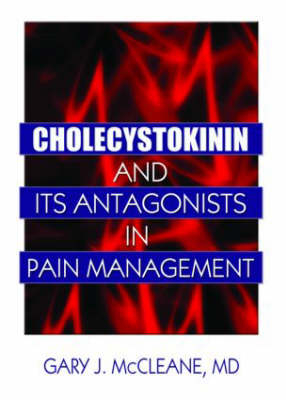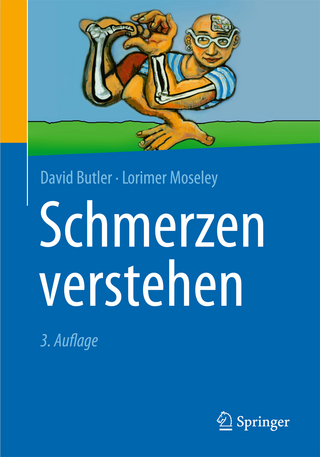
Cholecystokinin and Its Antagonists in Pain Management
Haworth Press Inc (Verlag)
978-0-7890-2893-8 (ISBN)
- Titel ist leider vergriffen;
- Artikel merken
Cholecystokinin (CCK), the regulatory peptide hormone found primarily in the gastrointestinal tract that works as a neurotransmitter throughout the nervous system, has been researched for years. CCK antagonists in conjunction with opioids are beginning to be seen as having possible major therapeutic benefits in pain management. Cholecystokinin and Its Antagonists in Pain Management is an extensive examination that gathers the mounting compelling evidence into one comprehensive source. Here researchers, neuroscientists, physicians, and pharmacy professionals are given the research and findings they need to explore the possible applications of CCK antagonists for a variety of illnesses.
Cholecystokinin and Its Antagonists in Pain Management extensively describes opioids in pain management, CCK and the body’s uses for the chemical, CCK receptor antagonists, and the evidence that points to its being a possible breakthrough application in pain management. Various animal studies are offered that present a convincing view of what may be the future of chronic pain management, with less side effects and a reduction in analgesic tolerance than when opioids are used alone. Potential uses of CCK antagonists are clearly discussed. The book is comprehensively referenced and provides several tables and graphs to fully illustrate the research findings.
Topics in Cholecystokinin and Its Antagonists in Pain Management include:
in vivo localization of CCK
CCK as a gut and nervous system peptide
factors that increase CCK
anti-opioid effects
CCK receptor antagonists
pro-analgesic effect of CCK antagonists
CCK antagonists reducing analgesic tolerance to opioids
safety of combining opioids and CCK antagonists
human clinical application of CCK antagonists
Cholecystokinin and Its Antagonists in Pain Management is a crucial source of the latest information and research results on CCK that is certain to be important for neuroscientists, clinicians, and pharmaceutical industry professionals.
Chapter 1. Introduction
Chapter 2. Opioids in Pain Management
Codeine
Dihydrocodeine
Tramadol
Morphine
Oxycodone
Fentanyl
Hydromorphone
Buprenorphine
Conclusions
Chapter 3. Cholecystokinin
The Original Description of Cholecystokinin
Molecular Characteristics of Cholecystokinin
Synthesis and Degradation of Cholecystokinin
Chapter 4. Cholecystokinin As a Gut Peptide
Cholecystokinin Release
Effect of CCK
Chapter 5. Cholecystokinin As a Central Nervous System Peptide
CCK A and CCK B
Distribution of CCK Receptors
Chapter 6. Central Effect of Cholecystokinin
Opioid Receptors and Intracellular Calcium
Noradrenaline Release in the Rat Supraoptic Nucleus
Dynorphin
Delta Opioid Receptors
Rostral Ventromedial Medulla
Dopamine
Alpha Adrenergic Receptors
Chapter 7. Factors That Increase Central Cholecystokinin Representation
Potassium
Neural Injury
Gamma-Aminobutyric Acid
Vasoactive Intestinal Peptide
Morphine
Chapter 8. Cholecystokinin As an Antiopioid Peptide
Effect of CCK on Opioid Antinociception
Influence of CCK Type on Opioid Antinociception
Chapter 9. Cholecystokinin Receptor Antagonists
Mixed CCK A and B Antagonists
CCK A Antagonists
CCK B Antagonists
Alternative Classification
CCK Antagonists with Other Effects
Chapter 10. Do Cholecystokinin Antagonists Influence Opioid-Derived Antinociception?
Proglumide
PD134,308/CI988
L365,260
PD135,158
Comparisons Between CCK Antagonists
CCK Antagonists and Enkephalins
CCK Antagonists and Tricyclic Antidepressants
Summary
Chapter 11. Do CCK Antagonists Reduce Tolerance to the Antinociceptive Effects of Opioids?
Effect of CCK Antagonists on Antinociceptive Effect of Opioids
Effect on Morphine Dependence
Conclusions
Chapter 12. Is the Combination of Opioids and CCK Antagonists Safe?
L364,718 and Squirrel Monkeys
L365,260 and Humans
Conclusion
Chapter 13. Human Studies of the Combination of CCK Antagonists and Opioids
Experimental Pain
Postsurgical Pain
Cancer Pain
Chronic Benign Pain
Neuropathic Pain
Analgesic Tolerance
Diet and Its Effect on Endogenous CCK Levels
Issues with the Human Literature
Conclusions
Chapter 14. Other Potential Uses of CCK Antagonists
Biliary Colic
Pancreatitis
Anxiolysis
Dependence and Withdrawal Reactions
Conclusions
Chapter 15. Conclusions
Notes
Index
| Erscheint lt. Verlag | 1.9.2006 |
|---|---|
| Verlagsort | Binghamton |
| Sprache | englisch |
| Gewicht | 249 g |
| Themenwelt | Medizin / Pharmazie ► Medizinische Fachgebiete ► Schmerztherapie |
| ISBN-10 | 0-7890-2893-X / 078902893X |
| ISBN-13 | 978-0-7890-2893-8 / 9780789028938 |
| Zustand | Neuware |
| Informationen gemäß Produktsicherheitsverordnung (GPSR) | |
| Haben Sie eine Frage zum Produkt? |
aus dem Bereich


